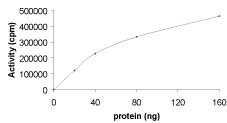
STK3, Active(S24-10G)
FOR BULK ORDER REQUESTS PLEASE CONTACT US
Description :Recombinant full-length human STK3 was expressed by baculovirus in Sf9 insect cells using a N-terminal GST tag.
Species :Human
Tag :GST tag
Expression System:Sf9 insect cells using baculovirus
Sequence :Full Length
Genbank Number :BC010640
Specific Activity :Sample Kinase Activity Plot. For specific information on a given lot, see related technical data sheet.
Purity :Sample Purity Data. For specific information on a given lot, see related technical data sheet. 
Storage, Stability and Shipping :Store product at –70oC. For optimal storage, aliquot target into smaller quantities after centrifugation and store at recommended temperature. For most favorable performance, avoid repeated handling and multiple freeze/thaw cycles.
Applications :Kinase Assay, Western Blot
Molecular Weight :~87 kDa
Gene Aliases :KRS1; MST2; FLJ90748
Scientific Background :STK3, also known as MST2, encodes a protein of 491-amino acid which contains an N-terminal catalytic domain characteristic of STKs (1). STK3 and STK4 share 94% amino acid identity in the catalytic domain and 78% identity overall. RAF1 has been shown to counteract apoptosis by suppressing the activation of mammalian sterile 20-like kinase (MST2). STK3 is a kinase that is activated by the proapoptotic agents straurosporine and FAS ligand (2). STK3 activation presumably allows cells to resist unfavorable environmental conditions.
References :
1. Creasy, C L. et al: Cloning and characterization of a member of the MST subfamily of Ste20-like kinases. Gene 167: 303-306, 1995.
2. Lee, K K. et al: MST, a physiological caspase substrate, higly sensitizes apoptosis both upstream and downstream of caspase activation. J. Biol. Chem. 276: 19276-19285, 2001.
Product Sheets (By Lot #) :
Research Areas :Cancer, Neurobiology, Inflammation, Cardiovascular Disease, AKT/PKB Pathway, JNK/SAPK Pathway, Apoptosis/Autophagy, Ser/Thr Kinases, Cancer, Neurobiology, Inflammation, Cardiovascular Disease, AKT/PKB Pathway, JNK/SAPK Pathway, Apoptosis/Autophagy, Ser/Thr Kinases
